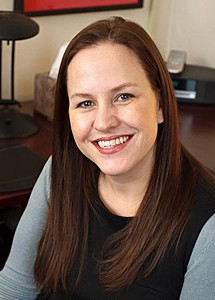
UC Research Explores Alternatives to the School Funding Dilemma
Theyre popping up around the country behind darkened windows, often in strip malls in low-income areas. The debate continues as to whether these so-called Internet sweepstakes cafés offer games or Internet gambling. At a national conference, a University of Cincinnati researcher examines whether this emerging industry could hold alternative revenue resources for struggling school districts.
Carlee Poston Escue, an assistant professor in the UC Educational Leadership program, presents Economic Hardships: Exploring Alternative Funding Sources on July 29 at the National Forum on Educational Statistics Summer Data Conference in Bethesda, Md. The conference is sponsored by the National Center for Educational Statistics, Institute of Educational Sciences, U.S. Department of Education.
Escue says that since the recession, Internet sweepstakes cafés are quickly becoming a growing industry with little legislative involvement. Customers buy time on café computers and play sweepstakes that resemble playing slot machines. Her presentation examines the potential of these businesses to contribute additional funding to support pre-K-12 public education. She says that as property wealth and the economy continue to remain unstable, its time to consider alternative funding resources as once stable funding venues are no longer viable for financing public education.
Escues presentation includes a funding formula that she developed that would recycle money to support education into the communities where the sweepstakes cafés are located areas where schools are getting squeezed the hardest in funding. Education funding primarily comes from property taxes, and were going to have to become more flexible in how to generate alternative revenue, says Escue. This would involve taking a situation in which people are not being the most prudent with their finances, but sweepstakes profits could be recycled back into their community through education funding, which would be good for society as a whole.
The National Forum on Educational Statistics strives to provide states, districts and schools with helpful advice on the collection, maintenance and use of elementary and secondary education data.
UCs Educational Leadership Program is dedicated to preparing excellent leaders for excellent schools. The college reports that hundreds of graduates of the program currently serve in the Cincinnati USA region and beyond. The program provides graduate study, research and field experiences for educators and offers a variety of degree and licensure programs as part of its mission.
UCs College of Education, Criminal Justice, and Human Services has been dedicated to excellence in teaching for more than a century. The college prepares students to work in diverse communities, provides continual professional development and fosters education leadership at the local, state, national and international levels.
Related Stories
Information Security Roadshow spreads awareness
May 3, 2024
The University of Cincinnati's Office of Information Security launched a series of 18 in-person sessions from January to April 2024, drawing nearly 350 attendees from the staff of various UC colleges and units. The Information Security Roadshow series aimed to equip the audience with knowledge on prevailing cyber threats, prevention strategies, how to report incidents and resources to stay informed and secure.
Teeing off a new tradition with UC’s Ed Latessa Memorial Golf...
May 3, 2024
On April 23, 2024, members of the University of Cincinnati’s School of Criminal Justice, part of the College of Education, Criminal Justice, Human Services, and Information Technology (CECH), gathered with family and friends at Glenview Golf Course in Glendale, Ohio, for a round of golf. This wasn’t just any day on the greens, though – this was the inaugural Ed Latessa Memorial Golf Tournament.
Spectrum News: How to reduce risks of security camera privacy...
May 2, 2024
Individuals can take steps to protect themselves from privacy invasions, such as ones that led to a more than $5 million settlement with Ring, an Amazon-owned security company, Spectrum News reported.
